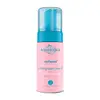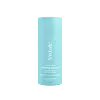What's inside
What's inside
 Key Ingredients
Key Ingredients

 Benefits
Benefits

 Concerns
Concerns

 Ingredients Side-by-side
Ingredients Side-by-side

Water
Skin ConditioningLauric Acid
CleansingGlycerin
HumectantPotassium Hydroxide
BufferingDecyl Glucoside
CleansingPropylene Glycol
HumectantPropanediol
SolventMyristic Acid
CleansingCoco-Glucoside
CleansingGlyceryl Oleate
EmollientSorbitol
HumectantStearic Acid
CleansingPalmitic Acid
EmollientOlive Oil PEG-7 Esters
EmollientPolyquaternium-39
Parfum
MaskingPhenoxyethanol
PreservativePanthenol
Skin ConditioningPEG-12 Dimethicone
Skin ConditioningJojoba Wax PEG-120 Esters
Tetrasodium EDTA
Carica Papaya Fruit Extract
Skin ConditioningBenzophenone-4
UV AbsorberHyaluronic Acid
HumectantNiacinamide
SmoothingCitrullus Lanatus Fruit Extract
Skin ConditioningWater, Lauric Acid, Glycerin, Potassium Hydroxide, Decyl Glucoside, Propylene Glycol, Propanediol, Myristic Acid, Coco-Glucoside, Glyceryl Oleate, Sorbitol, Stearic Acid, Palmitic Acid, Olive Oil PEG-7 Esters, Polyquaternium-39, Parfum, Phenoxyethanol, Panthenol, PEG-12 Dimethicone, Jojoba Wax PEG-120 Esters, Tetrasodium EDTA, Carica Papaya Fruit Extract, Benzophenone-4, Hyaluronic Acid, Niacinamide, Citrullus Lanatus Fruit Extract
Water
Skin ConditioningSodium Cocoamphoacetate
CleansingDecyl Glucoside
CleansingAcrylates Copolymer
Sodium Cocoyl Isethionate
CleansingPEG-7 Glyceryl Cocoate
EmulsifyingCoco-Glucoside
CleansingGlycol Stearate
EmollientGlycerin
HumectantGlyceryl Oleate
EmollientOlive Oil PEG-7 Esters
EmollientPhenoxyethanol
PreservativeEthylhexylglycerin
Skin ConditioningOctenidine Hcl
AntimicrobialPropanediol
SolventTriethanolamine
BufferingSodium PCA
HumectantPanthenol
Skin ConditioningSodium Hyaluronate
HumectantProline
Skin ConditioningHydroxyproline
Skin ConditioningChondrus Crispus Extract
Skin ConditioningCitric Acid
BufferingCarbomer
Emulsion StabilisingSodium Phytate
Water, Sodium Cocoamphoacetate, Decyl Glucoside, Acrylates Copolymer, Sodium Cocoyl Isethionate, PEG-7 Glyceryl Cocoate, Coco-Glucoside, Glycol Stearate, Glycerin, Glyceryl Oleate, Olive Oil PEG-7 Esters, Phenoxyethanol, Ethylhexylglycerin, Octenidine Hcl, Propanediol, Triethanolamine, Sodium PCA, Panthenol, Sodium Hyaluronate, Proline, Hydroxyproline, Chondrus Crispus Extract, Citric Acid, Carbomer, Sodium Phytate
Ingredients Explained
These ingredients are found in both products.
Ingredients higher up in an ingredient list are typically present in a larger amount.
Coco-Glucoside is a surfactant, or a cleansing ingredient. It is made from glucose and coconut oil.
Surfactants help gather dirt, oil, and other pollutants from your skin to be rinsed away.
This ingredient is considered gentle and non-comedogenic. However, it may still be irritating for some.
Learn more about Coco-GlucosideDecyl Glucoside is a glucose-based surfactant and emulsion stabilizer. It is created by reacting glucose with the fatty acids from plants.
Surfactants help clean the skin by trapping oil, sebum, and dirt to be washed away. As an emulsion stabilizer, it stabilizes the ingredients in a product by preventing them from separating.
This ingredient is biodegradable and non-toxic. This ingredient is commonly found in baby shampoos.
Decyl Glucoside is sometimes used to stabilize the UV filter Tinosorb.
Learn more about Decyl GlucosideGlycerin is already naturally found in your skin. It helps moisturize and protect your skin.
A study from 2016 found glycerin to be more effective as a humectant than AHAs and hyaluronic acid.
As a humectant, it helps the skin stay hydrated by pulling moisture to your skin. The low molecular weight of glycerin allows it to pull moisture into the deeper layers of your skin.
Hydrated skin improves your skin barrier; Your skin barrier helps protect against irritants and bacteria.
Glycerin has also been found to have antimicrobial and antiviral properties. Due to these properties, glycerin is often used in wound and burn treatments.
In cosmetics, glycerin is usually derived from plants such as soybean or palm. However, it can also be sourced from animals, such as tallow or animal fat.
This ingredient is organic, colorless, odorless, and non-toxic.
Glycerin is the name for this ingredient in American English. British English uses Glycerol/Glycerine.
Learn more about GlycerinGlyceryl Oleate is the ester of glycerin and oleic acid. This ingredient is mainly an emollient and emulsifier.
Emollients soften and hydrate the skin by creating a thin film on top to trap in moisture. As an emulsifier, glyceryl oleate helps stabilize formulations by preventing ingredients such as oil and water from separating. According to a manufacturer, this ingredient helps helps thicken water-in-oil formulations, shower gels, and hair shampoos.
In some products, this ingredient may be used as a fragrance / perfuming ingredient. The scent of this ingredient is described to be "waxy".
Glyceryl oleate is created from oils rich in oleic acid, such as peanut oil and olive oil.
This ingredient may not be malassezia folliculitis safe.
Learn more about Glyceryl OleatePanthenol is a common ingredient that helps hydrate and soothe the skin. It is found naturally in our skin and hair.
There are two forms of panthenol: D and L.
D-panthenol is also known as dexpanthenol. Most cosmetics use dexpanthenol or a mixture of D and L-panthenol.
Panthenol is famous due to its ability to go deeper into the skin's layers. Using this ingredient has numerous pros (and no cons):
Like hyaluronic acid, panthenol is a humectant. Humectants are able to bind and hold large amounts of water to keep skin hydrated.
This ingredient works well for wound healing. It works by increasing tissue in the wound and helps close open wounds.
Once oxidized, panthenol converts to pantothenic acid. Panthothenic acid is found in all living cells.
This ingredient is also referred to as pro-vitamin B5.
Learn more about PanthenolPhenoxyethanol is a preservative that has germicide, antimicrobial, and aromatic properties. Studies show that phenoxyethanol can prevent microbial growth. By itself, it has a scent that is similar to that of a rose.
It's often used in formulations along with Caprylyl Glycol to preserve the shelf life of products.
Propanediol is an all-star ingredient. It softens, hydrates, and smooths the skin.
It’s often used to:
Propanediol is not likely to cause sensitivity and considered safe to use. It is derived from corn or petroleum with a clear color and no scent.
Learn more about PropanediolWater. It's the most common cosmetic ingredient of all. You'll usually see it at the top of ingredient lists, meaning that it makes up the largest part of the product.
So why is it so popular? Water most often acts as a solvent - this means that it helps dissolve other ingredients into the formulation.
You'll also recognize water as that liquid we all need to stay alive. If you see this, drink a glass of water. Stay hydrated!
Learn more about Water